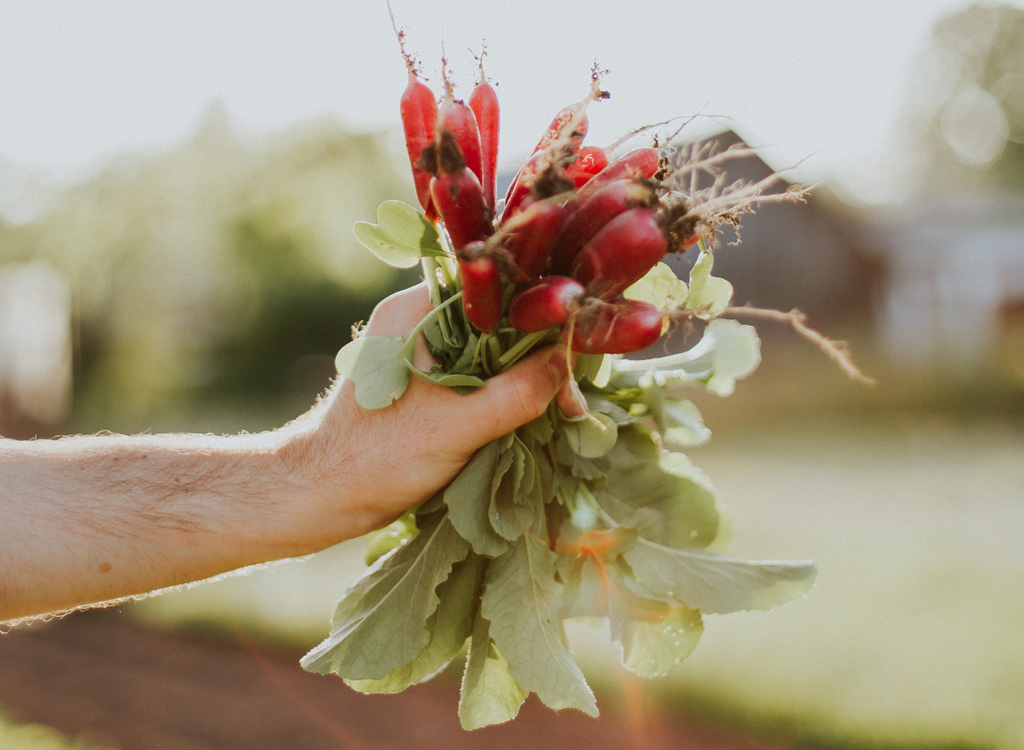4 'Facts' About Organic Food That Are Actually False

A whopping 82.3 percent of American households stock up on organic food, according to data released by the Organic Trade Association (OTA). Whether it's because families are becoming more cognizant of investing in nutrition or inclined to support small-scale farming, organic food sales have skyrocketed over the last decade. But what if everything we know—or think we know—about the supposed chemical-free practices are just popular misconceptions? Are these organic facts actually false?
Since buying organic can seriously etch a dent into your wallet—the USDA found that organic fruits and vegetables are up to 30 percent pricier than conventional!—we did some digging into whether the claims organic farming are praised for actually ring true. To debunk these widespread myths, we spoke to retired chemist Richard Sachleben, PhD, and came to some eye-opening conclusions you'll definitely want to keep in mind before your next grocery run.
1. Organic Foods are More Nutritious
Health concerns are a major driver of buying organic foods, as three-quarters of American adults reported buying organic foods several times during the past month. However, a product labeled with the USDA-regulated green-and-white seal isn't necessarily a confirmation that the food is more nutritious.
"From a nutritional standpoint, I am not aware of any good scientific data showing that organic produce is more nutritious than conventionally raised produce," Sachleben admits. A systematic review in the Annals of Internal Medicine examined 200 peer-reviewed studies and found that there's no conclusive evidence that supports that organic foods are significantly more nutritious than conventional foods.
2. Organic Farming is Better For the Environment
While there is solid data proving that biodiversity in an organic field is higher than in a conventional one, Sachleben says that the environmental benefits are dependent on two factors: what you're growing and where you're growing it. For crops such as soybeans and rice, growing them organic produces almost the same yield as conventional while growing organic wheat and potatoes will produce lower yields than if grown conventionally, Sachleben says.
"On average, most studies show that organic farming produces about 20 percent lower yields than conventional farming growing similar crops."
Where the climate is favorable to a specific crop and the crop isn't as demanding on the soil, organic yields can be comparable to conventional. However, when the environment is less than ideal or the soil is not suited for that specific crop, conventional agriculture trumps organic.
The bottom line: Organic farms are more biodiverse, but it takes more land to grow organic produce than it does to raise them conventionally. Conventional farming has more tools (such as synthetic fertilizer, which is more readily available, less costly, and easier to apply in the required amounts than organic fertilizer) to offset low yields, which ultimately results in fewer instances where natural landscapes must be cleared for farmland.
Another challenge lies in controlling pests such as insects or fungi in fruit farms, which can potentially destroy an entire orchard. Organic farms don't have as many pest-control means as traditional farms and therefore can lose a lot of marketable produce. Not only that, conventional farms often use chemicals that prevent blemishes on the surface, which is why you notice more "ugly" produce that's organic. Since consumers usually opt for the more aesthetically pleasing fruit, this unfortunate human factor further reduces organic farms' marketable yield.
3. Organic Farms Are Pesticide-Free
A common misconception about organic farms is that they're pesticide-free. Organic farms are actually allowed to use pesticides—as long as they're organic. These pest repellants are made of safe and natural substances such as soaps, lime sulfur, hydrogen peroxide.
While organic pesticides aren't toxic to humans and mammals and break down fairly quickly, they are essentially used to target pests—and the issue lies within the fact that these sprays will kill target bugs as well as non-targets such as bees, butterflies, and other pollinators.
However, Sachleben states that there are insect control and pest management systems (used in both organic and conventional farming) that have less impact on non-target species. Most insects have a life cycle that's specific to a plant's cycle, and farmers can optimize pest control by controlling when they spray as well as avoiding spraying on flowers.
4. Organic Foods Taste Better
While this debate is subjective, many organic-buying folks swear that their produce tastes better than conventional. One study in the PLoS One journal discovered that foods with environmentally-responsible labels such as "fair-trade" and "organically produced" rendered higher scores on taste tests.
However, keep in mind that expectation bias plays a significant role in the outcome of open-label studies. Another study found that conventionally grown tomatoes were sweeter and juicier than their organic counterparts. Bottom line: When it comes to demystifying whether this "fact" is bogus or not, you'll have to do your own research.








